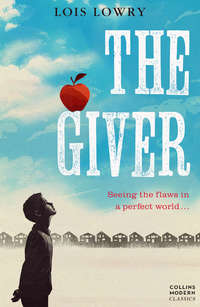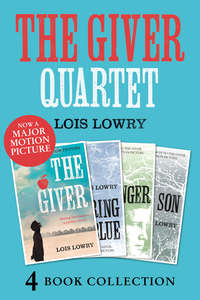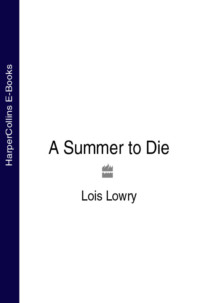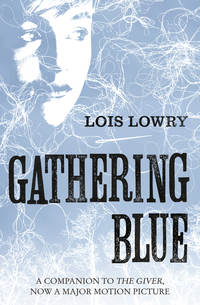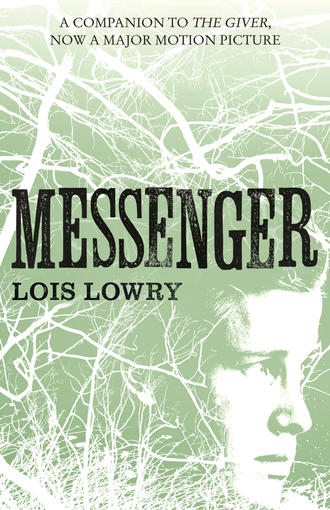
Полная версия
Messenger
“Yes, here,” Matty said. He scrambled down the slippery bank to the place where a boulder, large enough to stand on, jutted out. Both boys climbed the huge outcropping of rock and settled at the top to prepare their fishing gear and cast their lines for salmon.
Behind them, Village, quiet and peaceful, continued its daily life. Gatherer had been buried this morning. With her toddler playing on the floor by her feet, his widow now nursed her new baby on the porch of her homeplace, attended by comforting women who sat with their knitting and embroidery and spoke only of happy things.
In the schoolhouse, Mentor, the schoolteacher, gently tutored a mischievous eight-year-old named Gabe, who had neglected his studies to play and now needed help. His daughter, Jean, sold flower bouquets and loaves of fresh-baked bread in her marketplace stall while she flirted, laughing, with the gangly, self-conscious boys who stopped by.
The blind man, Seer, made his way through the lanes of Village, checking on the populace, assessing the well-being of each individual. He knew each fence post, each crossroad, each voice and smell and shadow. If anything was amiss, he would do his best to make it right.
From a window, the tall young man known as Leader looked down and watched the slow and cheerful pace of Village, of the people he loved, who had chosen him to rule and guard them. He had come here as a boy, finding his way with great difficulty. The Museum held the remains of a broken sled in a glass case, and the inscription explained that it had been Leader’s arrival vehicle. There were many relics of arrival in the Museum, because each person who had not been born in Village had his own story of coming there. The blind man’s history was told there, too: how he had been carried, near dead, from the place where enemies had left him with his eyes torn out and his future in his own place gone.
In the Museum’s glass cases there were shoes and canes and bicycles and a wheeled chair. But somehow the small red-painted sled had become a symbol of courage and hope. Leader was young but he represented those things. He had never tried to go back, never wanted to. This was his home now, these his people. As he did every afternoon, he stood at the window and watched. His eyes were a pale, piercing blue.
He watched with gratitude as the blind man moved through the lanes.
He could see beyond a porch railing to the young woman who rocked an infant and mourned her husband. Grieve gently, he thought.
He could see beyond the cornfield to where two young boys named Matty and Ramon were dangling lines into the river. Good fishing, he thought.
He could see beyond the marketplace to the cemetery where Gatherer’s ruined body had been buried. Rest in peace, he thought.
Finally he looked toward the border of Village, to the place where the path entered Forest and became shrouded in shadows. Leader could see beyond the shadows but was not certain what he saw. It was blurred, but there was something in Forest that disturbed Leader’s consciousness and made him uneasy. He could not tell whether it was good or bad. Not yet.
* * *
Deep in the thick undergrowth near the clearing, at the edge of Leader’s puzzled awareness, a small green frog ate an insect it had caught with its sticky, fast-darting tongue. Squatting, it moved its protruding eyes around, trying to sense more insects to devour. Finding nothing, it hopped away. One back leg was oddly stiff but the frog barely noticed.

IF WE HAD a Gaming Machine,” Matty commented in a studied, offhand manner, “our evenings would never be boring.”
“You think our evenings are boring, Matty? I thought you enjoyed our reading together.”
Seer laughed, and corrected himself. “Sorry. I meant your reading to me, Matty, and my listening. It’s my favorite time of day.”
Matty shrugged. “No, I like reading to you, Seer. But I meant it’s not exciting.”
“Well, we should choose a different book, perhaps. That last one — I’ve forgotten its name, Matty — was a little slow-going. Moby Dick. That was the one.”
“It was okay,” Matty conceded. “But it was too long.”
“Well, ask at the library for something that would move along more quickly.”
“Did I explain to you how a Gaming Machine works, Seer? It moves very quickly.”
The blind man chuckled. He had heard it all before, many times. “Run out to the garden and get a head of lettuce, Matty, while I finish cleaning the fish. Then you can make a salad while the fish cooks.”
“And also,” Matty continued in a loud voice as he headed for the garden just beyond the door, “it would be a nice end to a meal. Something sweet. Sort of a dessert. I did tell you, didn’t I, how the Gaming Machine gives you a candy when you win?”
“See if there’s a nice ripe tomato while you’re out there getting the lettuce. A sweet one,” Seer suggested in an amused voice.
“You might get a peppermint,” Matty went on, “or a gumdrop, or maybe something they call a sourball.” Beside the back step he reached into the vegetable garden and uprooted a small head of lettuce. As an afterthought, he pinched a cucumber loose from its vine nearby, and pulled some leaves from a clump of basil. Back in the kitchen, he put the salad things in the sink and halfheartedly began to wash them.
“Sourballs come in different colors, and each color is a flavor,” he announced, “but I suppose that wouldn’t interest you.”
Matty sighed. He looked around. Even though he knew the blind man wouldn’t see his gesture, he pointed to the nearby wall, which was decorated by a colorful wall-hanging, a gift from the blind man’s talented daughter. Matty stood often before it, looking carefully at the intricate embroidered tapestry depicting a large thick forest separating two small villages far from each other. It was the geography of his own life, and that of the blind man, for they had both moved from that place to this other, with great difficulty.
“The Gaming Machine could stand right there,” he decided. “It would be very convenient. Extremely convenient,” he added, aware that the blind man liked it when he exercised his vocabulary.
Seer went to the sink, moved the washed lettuce to the side, and began to rinse the cleaned salmon steaks. “And so we would give up — or maybe even trade away — reading, and music, in exchange for the extreme excitement of pulling a handle and watching sourballs spit forth from a mechanical device?” he asked.
Put that way, Matty thought, the Gaming Machine didn’t actually seem such a good trade. “Well,” he said, “it’s fun.”
“Fun,” the blind man repeated. “Is the stove ready? And the pan?”
Matty looked at the stove. “In a minute,” he said. He stirred the burning wood a bit so that the fire flared. Then he placed the oiled pan on top. “I’ll do the fish,” he said, “if you fix the salad.
“I brought some basil in, too,” he added, with a grin, “just because you’re such a salad perfectionist. It’s right there beside the lettuce.” He watched while the blind man’s deft hands found the basil and tore the leaves into the wooden bowl.
Then Matty took the fish and laid it in the pan, swirling the oil around. In a moment the aroma of the sautéing salmon filled the room.
Outside, it was twilight. Matty adjusted the wick on an oil lamp and lighted it. “You know,” he remarked, “when you win a candy, a bell rings and colored lights blink. Of course that wouldn’t matter to you,” he added, “but some of us would really appreciate —”
“Matty, Matty, Matty,” the blind man said. “Keep an eye on that fish. It cooks quickly. No bell rings when it’s done.
“And don’t forget,” he added, “that they traded for that Gaming Machine. It probably came at a high cost.”
Matty frowned. “Sometimes you get licorice,” he said as a last attempt.
“Do you know what they traded? Has Ramon told you?”
“No. Nobody ever tells.”
“Maybe he doesn’t even know. Maybe his parents didn’t tell him. That’s probably good.”
Matty took the pan from the stove and slid the browned fish onto two plates, one after the other. He placed them on the table and brought the salad bowl from the sink. “It’s ready,” he said.
The blind man went to the bread container and found two thick pieces of bread that smelled fresh-baked. “I got this at the marketplace this morning,” he said, “from Mentor’s daughter. She’ll make someone a good wife. Is she as pretty as her voice makes her sound?”
But Matty was not going to be diverted by reminders of the schoolteacher’s pretty daughter. “When’s the next Trade Mart?” he asked, when they were both seated.
“You’re too young.”
“I heard that there was one coming soon.”
“Pay no attention to what you hear. You’re too young.”
“I won’t be always. I ought to watch.”
The blind man shook his head. “It would be painful,” he said. “Eat your fish now, Matty, while it’s warm.”
Matty poked at the salmon with his fork. He could tell that there was to be no more discussion of trading. The blind man had never traded, not one single time, and was proud of it. But Matty thought that someday he himself would. Maybe not for a Gaming Machine. But there were other things that Matty wanted. He ought to be allowed to know how the trading worked.
He decided he would find out. But first he had the other thing to worry about, and the troubling awareness that he had not dared to tell the blind man of it.
* * *
There were no secrets in Village. It was one of the rules that Leader had proposed, and all of the people had voted in favor of it. Everyone who had come to Village from elsewhere, all of those who had not been born here, had come from places with secrets. Sometimes — not very often, for inevitably it caused sadness — people described their places of origin: places with cruel governments, harsh punishments, desperate poverty, or false comforts.
There were so many such places. Sometimes, hearing the stories, remembering his own childhood, Matty was astounded. At first, having found his way to Village, he had thought his own brutal beginnings — a fatherless hovel for a home; a grim, defeated mother who beat him and his brother bloody — were unusual. But now he knew that there were communities everywhere, sprinkled across the vast landscape of the known world, in which people suffered. Not always from beatings and hunger, the way he had. But from ignorance. From not knowing. From being kept from knowledge.
He believed in Leader, and in Leader’s insistence that all of Village’s citizens, even the children, read, learn, participate, and care for one another. So Matty studied and did his best.
But sometimes he slipped back into the habits of his earlier life, when he had been a sly and deceitful boy in order to survive.
“I can’t help it,” he had argued glumly to the blind man, in the beginning of their life together, when he had been caught in some small transgression. “It’s what I learnt.”
“Learned.” The correction was gentle.
“Learned,” Matty had repeated.
“Now you are relearning. You are learning honesty. I’m sorry to punish you, Matty, but Village is a population of honest and decent people, and I want you to be one of us.”
Matty had hung his head. “So you’ll beat me?”
“No, your punishment will be no lessons today. You will help me in the garden instead of going to school.”
It had seemed, to Matty then, a laughable punishment. Who wanted to go to school, anyway? Not him!
Yet, when he was deprived of it, and could hear the other children reciting and singing in the schoolhouse, he felt woefully lost. Gradually he had learned to change his behavior and to become one of Village’s happy children, and soon a good student. Now half grown and soon to finish school, he slipped only occasionally into old bad habits and almost always caught himself when he did.
It bothered Matty greatly, now, having a secret.

LEADER HAD SUMMONED Matty for message-running.
Matty enjoyed going to Leader’s homeplace, because of the stairs — others had stairs, though Matty and the blind man did not, but Leader’s stairs were circular, which fascinated Matty, and he liked going up and down — and because of the books. Others had books, too. Matty had a few schoolbooks, and he often borrowed other books from the library so that he could read stories to the blind man in the evenings, a time they both enjoyed.
But Leader’s homeplace, where he lived alone, had more books than Matty had ever seen in one place. The entire ground floor, except for the kitchen to one side, was lined with shelves, and the shelves were filled with volumes of every sort. Leader allowed Matty to lift down and look at any one he wanted. There were stories, of course, not unlike the ones he found in the library. There were history books as well, like those he studied at school, the best ones filled with maps that showed how the world had changed over centuries. Some books had shiny pages that showed paintings of landscapes unlike anything Matty had ever seen, or of people costumed in odd ways, or of battles, and there were many quiet painted scenes of a woman holding a newborn child. Still others were written in languages from the past and from other places.
Leader laughed wryly when Matty had opened to a page and pointed to the unknown language. “It’s called Greek,” Leader said. “I can read a few words. But in the place of my childhood, we were not allowed to learn such things. So in my spare time, I have Mentor come and help me with languages. But …” Leader sighed. “I have so little spare time. Maybe when I’m old, I will sit here and study. I’d like that, I think.”
Matty had replaced the book and run his hand gently over the leather bindings of the ones beside it.
“If you weren’t allowed to learn,” he asked, “why did they let you bring the books?”
Leader laughed. “You’ve seen the little sled,” he said.
“In the Museum?”
“Yes. My vehicle of arrival. They’ve made such a thing of it, it’s almost embarrassing. But it is true that I came on that sled. A desperate boy, half dead. No books! The books were brought to me later. I have never been as surprised in my life as I was the day those books arrived.”
Matty had looked around at the thousands of books. In his own arms — and Matty was strong — he could have carried no more than ten or twelve at a time.
“How did they come to you?”
“A river barge. Suddenly there it was. Huge wooden crates aboard, and each one filled with books. Until that time I had always been afraid. A year had passed. Then two. But I was still afraid; I thought they would still be looking for me, that I would be recaptured, put to death, because no one had ever fled my community successfully before.
“It was only when I saw the books that I knew that things had changed, that I was free, and that back there, where I had come from, they were rebuilding themselves into something better.
“The books were a kind of forgiveness, I think.”
“So you could have gone back,” Matty said. “Was it too late? Had Forest given you Warnings?”
“No. But why would I go back? I had found a home here, the way everyone has. That’s why we have the Museum, Matty, to remind us of how we came, and why: to start fresh, and begin a new place from what we had learned and carried from the old.”
* * *
Today Matty admired the books, as he always did in Leader’s homeplace, but he didn’t linger to touch or examine them. Nor did he stop to admire the staircase, with its intricate risers of crafted, polished wood that ascended in a circle to the next level. When Leader called, “Up here, Matty,” he bounded up the stairs to the second floor, into the spacious room where Leader lived and worked.
Leader was at his desk. He looked up from the papers in front of him and smiled at Matty. “How’s the fishing?”
Matty shrugged and grinned. “Not too bad. Caught four yesterday.”
Leader laid his pen aside and leaned back in his chair. “Tell me something, Matty. You and your friend are out there a lot, fishing. And you’ve been doing it for a long time — since you came to Village as a little boy. Isn’t that so?”
“I don’t remember exactly how long. I was only about this high when I came.” Matty gestured with his hand, placing it level with the second button of his own shirt.
“Six years,” Leader told him. “You arrived six years ago. So you’ve been fishing for all that time.”
Matty nodded. But he stiffened. He was wary. It was too soon for his true name to be bestowed, he thought. Surely it was not going to be Fisherman! Was that why Leader had called him here?
Leader looked at him and began to laugh. “Relax, Matty! When you look like that, I can almost read your mind! Don’t worry. It was only a question.”
“A question about fishing. Fishing’s a thing I do just to get food or to fool around. I don’t want it to turn into something more.” Matty liked that about Leader, that you could say what you wanted to him, that you could tell him what you felt.
“I understand. You needn’t worry about that. I was asking because I need to assess the food supply. Some are saying there are fewer fish than there once were. Look here, what I’ve been writing.” He passed a paper over to Matty. There were columns of numbers, lists headed “Salmon” and “Trout.”
Matty read the numbers and frowned. “It might be true,” he said. “I remember at first I would pull fish after fish from the river. But you know what, Leader?”
“What?” Leader took the paper back from Matty and laid it with others on his desk.
“I was little then. And maybe you don’t remember this, because you’re older than I am …”
Leader smiled. “I’m still a young man, Matty. I remember being a boy.” Matty thought he noticed a brief flicker of sadness in Leader’s eyes, despite the warm smile. So many people in Village — including Matty — had sad memories of their childhoods.
“What I meant was, I remember all the fish, the feeling that they would never end. I felt that I could drop my line in again and again and again and there would always be fish. Now there aren’t. But, Leader …”
Leader looked at him and waited.
“Things seem more when you’re little. They seem bigger, and distances seem farther. The first time I came here through Forest? The journey seemed forever.”
“It does take days, Matty, from where you started.”
“Yes, I know. It still takes days. But now it doesn’t seem as far or as long. Because I’m older, and bigger, and I’ve gone back and forth again and again, and I know the way, and I’m not scared. So it seems shorter.”
Leader chuckled. “And the fish?”
“Well,” Matty acknowledged, “there don’t seem to be as many. But maybe it’s just that I was a little boy back then, when the fish seemed endless.”
Leader tapped the tip of his pen on the desk as he thought. “Maybe so,” he said after a moment. He stood. From a table in the corner of the room he took a stack of folded papers.
“Messages?” Matty asked.
“Messages. I’m calling a meeting.”
“About fish?”
“No. I wish it were just about fish. Fish would be easy.”
Matty took the stack of message papers he would be delivering. Before he turned to the staircase to leave, he felt compelled to say, “Fish aren’t ever easy. You have to use just the right bait, and know the right place to go, and then you have to pull the line up at just the right moment, because if you don’t, the fish can wiggle right off your hook, and not everybody is good at it, and …”
He could hear Leader laughing, still, when he left.
* * *
It took Matty most of the day to deliver all of the messages. It wasn’t a hard task. He liked the harder ones better, actually, when he was outfitted with food and a carrying pack and sent on long journeys through Forest. Although he hadn’t been sent to it in almost two years, Matty especially liked trips that took him back to his former home, where he could greet his boyhood pals with a somewhat superior smile, and snub those who had been cruel to him in the past. His mother was dead, he had been told. His brother was still there, and looked at Matty with more respect than he ever had in the past, but they were strangers to each other now. The community where he had lived was greatly changed and seemed foreign, though less harsh than he remembered.
Today he simply made his way around Village, delivering notice of the meeting that would be held the following week. Reading the message himself, he could understand Leader’s questioning about the supply of fish, and the concern and worry that Matty had felt from him.
There had been a petition — signed by a substantial number of people — to close Village to outsiders. There would have to be a debate, and a vote.
It had happened before, such a petition.
“We voted it down just a year ago,” the blind man reminded Matty when the message had been read to him. “There must be a stronger movement now.”
“There are still plenty of fish,” Matty pointed out, “and the fields are full of crops.”
The blind man crumpled the message and dropped it into the fire. “It’s not the fish or crops,” he said. “They’ll use that, of course. They argued dwindling food supply last time. It’s …”
“Not enough housing?”
“More than that. I can’t think of the word for it. Selfishness, I guess. It’s creeping in.”
Matty was startled. Village had been created out of the opposite: selflessness. He knew that from his studies and from hearing the history. Everyone did.
“But in the message — I could have read it to you again if you hadn’t burned it — it says that the group who wants to close the border is headed by Mentor! The schoolteacher!”
The blind man sighed. “Give the soup a stir, would you, Matty?”
Obediently Matty moved the wooden ladle around in the pot and watched beans and chopped tomatoes churn in the thick mixture as it simmered. Thinking still of his teacher, he added, “He’s not selfish!”
“I know he isn’t. That’s why it’s puzzling.”
“He welcomes everyone to the school, even new ones who have no learning, who can’t even speak properly.”
“Like you, when you came,” the blind man said with a smile. “It couldn’t have been easy, but he taught you.”
“He had to tame me first,” Matty acknowledged, grinning. “I was wild, wasn’t I?”
Seer nodded. “Wild. But Mentor loves teaching those who need it.”
“Why would he want to close the border?”
“Matty?”
“What?”
“Has Mentor traded, do you know?”
Matty thought about it. “It’s school vacation now, so I don’t see him as often. But I stop by his homeplace now and then …” He didn’t mention Jean, the widowed schoolteacher’s daughter. “I haven’t noticed anything different in his household.
“No Gaming Machine,” he added, laughing a little.
But the blind man didn’t chuckle in reply. He sat thinking for a moment. Then he said, in a worried voice, “It’s much more than just a Gaming Machine.”

THE SCHOOLTEACHER’S DAUGHTER told me that her dog has three puppies. I can have one when it’s big enough, if I like.”
“Isn’t she the one who promised you a kiss? Now a dog as well? I’d settle for the kiss if I were you, Matty.” The blind man smiled, loosened a beet from the earth, and placed it in the basket of vegetables. They were in the garden together.



